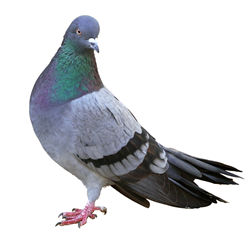Pigeons
 The Wildlife and Countryside Act 1981 protects all wild birds. It is an offence to kill or injure any birds or their nests or eggs unless acting under a licence and only in compliance with the conditions of that licence.
The Wildlife and Countryside Act 1981 protects all wild birds. It is an offence to kill or injure any birds or their nests or eggs unless acting under a licence and only in compliance with the conditions of that licence.
A general licence allows 'authorised persons' to undertake certain actions which would otherwise be illegal under the Wildlife and Countryside Act but only to certain birds in certain circumstances.
'Authorised person' means the owner or occupier or any person authorised by the owner or occupier of the land on which the action authorised takes place.
Why are pigeons a problem?
- Pigeons live in close association with people and usually roost and rest within or on buildings. Pigeons tend to live in flocks and can consequently cause a problem.
- Pigeon droppings are unsightly and can cause problems by making pavements and steps slippery, particularly in wet weather. Droppings can also corrode stonework and damage buildings.
- Nesting material, droppings and dead birds may block gutters and drains leading to water damage to buildings.
- The noise of pigeons in a roof space or roosting externally can be disturbing.
- Many household insect pests live naturally within nesting materials.
- Pigeons carry certain infections which can be transmitted to humans.
- Food supplied by the public leads to the arrival of more pigeons and increased breeding rates. Pigeons deprive other birds of food and spread mites and other parasites throughout their ever-increasing number of breeding sites.
- Feeding pigeons can attract vermin.
Pigeons can cause continuing problems at locations where they roost and nest e.g. railway bridges, and buildings and in the town centres of Dover, Deal and Sandwich. Although pigeon droppings and feathers are a cause for complaint, the Council can very seldom take any formal action to force owners to proof their premises against pigeons.
In cases where pigeons have gained access to a property and have caused a potentially serious public health problem such as pollution of a water tank, the Council may be able to take enforcement action against the property owners to remedy the problem.
How to deter pigeons
There are simple steps that you can take to help deter feral pigeons from visiting your garden.
- Preventing access to food is a key to dispersing pigeons.
- When feeding smaller birds, cage in all food so that pigeons cannot reach it. Maximum effective mesh size will be 2.5 inches. Pigeon-proof feeders are commercially available.
- Netting can prevent pigeons accessing recesses, buildings etc.
- Ledges can be protected by fitting specially designed spike strips or metal coil, or converting the ledge to a slope. Silicon gel can deter pigeons from roosting
- Be careful with your choice of deterrent. Those designed for use on agricultural land are unlikely to be suited to urban or suburban context.
- Any audible deterrent will not be pigeon specific, but is just as likely to scare any bird within its effective range. Furthermore, it may become a serious nuisance to your neighbours.
- Do not feed pigeons on the street or close to neighbouring properties.
A pigeons perspective
Feeding pigeons may seem kind but food like bread, cakes and buns can give them diarrhoea and induce vitamin B and calcium deficiency. Vitamin B deficiency can cause paralysis in pigeons.
What can the council do to stop the problems caused by bird feeding?
Whilst there is no specific law to stop people from feeding wild birds, we may be able to take action in serious cases, eg where rotting food accumulates or where the feeding causes vermin infestation.
If you are experiencing a problem with your neighbour feeding birds and they are a tenant, such behaviour, especially on communal grounds, may be covered by tenancy rules. Please contact your housing officer or landlord.
Professional treatment can be carried out by our preferred contractor AGS One Pest Control. To get a quote and arrange treatment please contact them either by telephoning 01304 759033 or by emailing pestcontrol@agsone.co.uk
More detail on general licenses are available at the Central Government website.
Further Information
Information from the Pigeon Control Resource Centre